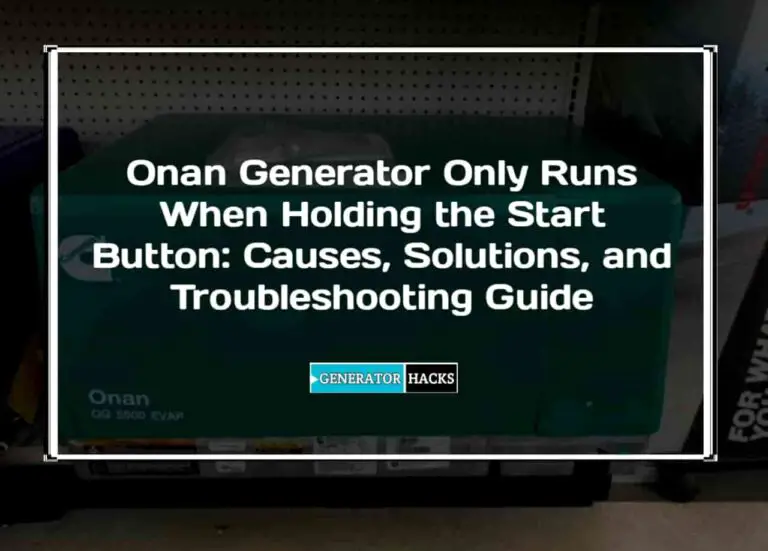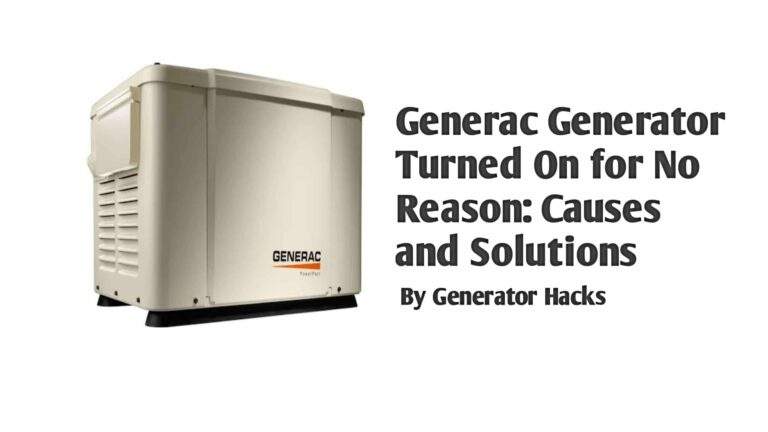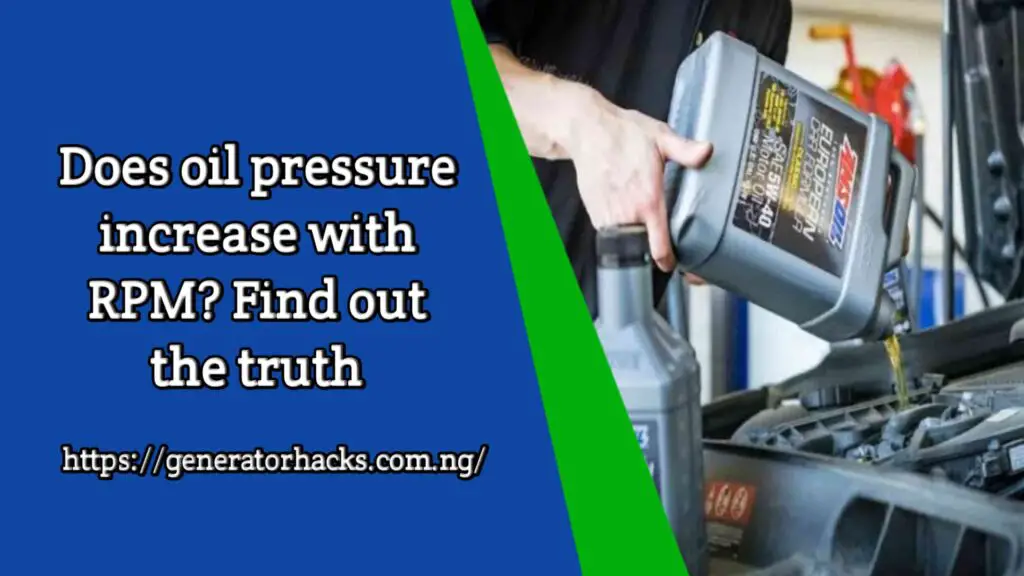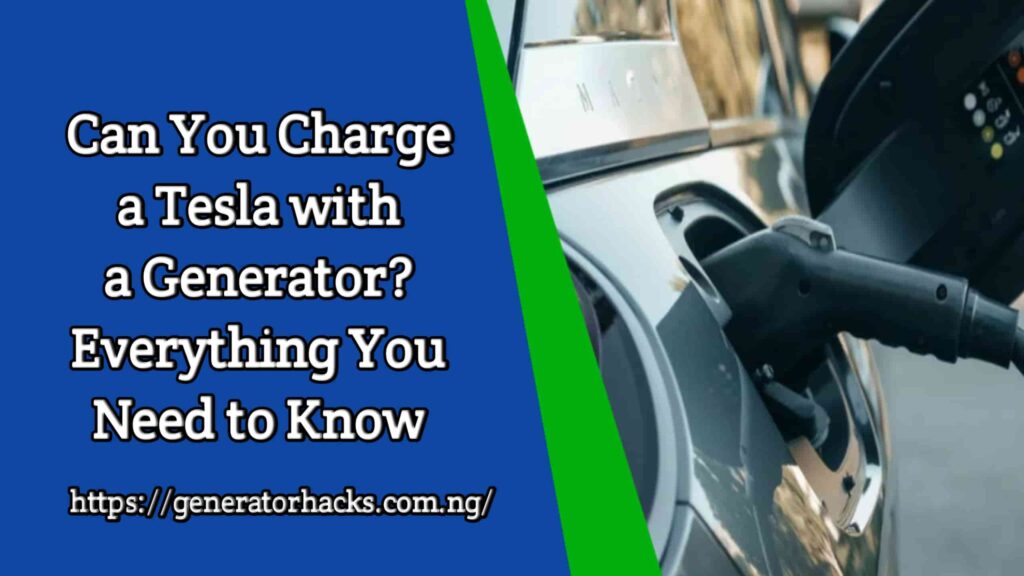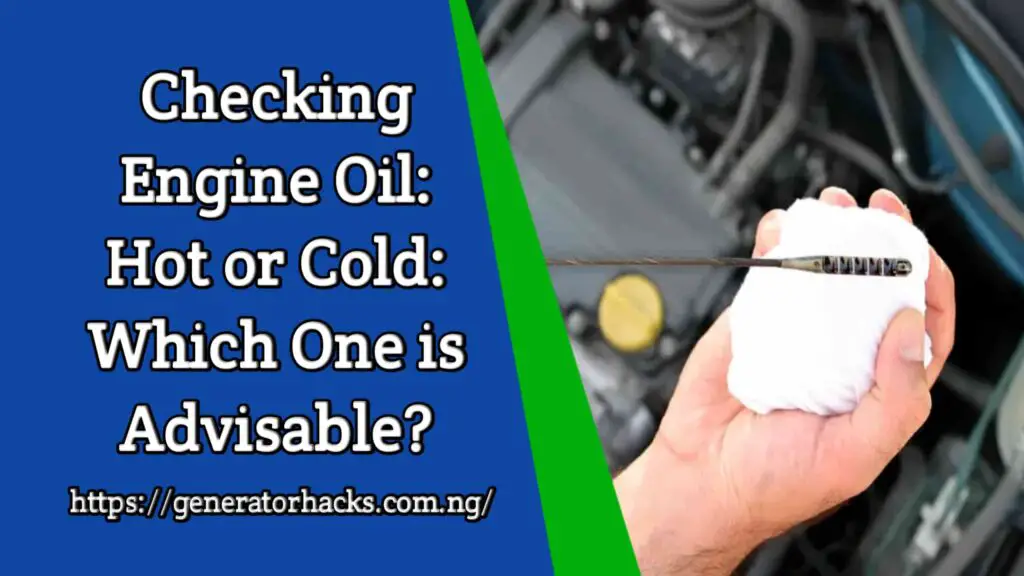As an Amazon Associate, we earn from qualifying purchases. This does not affect the price you pay or the quality of the products you buy. For more information, please read the full affiliate disclosure here.
When your generator overcrank, it refers to the situation where the generator’s engine cranks or rotates excessively without successfully starting or running for a long period.
This is caused by a lot of issues especially when the generator’s starting system fails to initiate the combustion process and the engine cannot reach its normal operating speed.
And instead of the generator starting, the generator’s engine continues cranking, consuming excessive battery power and potentially causing damage to the generator system.
Henceforth, in this blog post, I will explain what causes generator overcrank, the symptoms you will notice when you know your generator is overcranking, the potential risks involved, and how to fix a generator overcrank issue.
Symptoms of Generator Overcrank
When the generator overcrank to the extent it needs troubleshooting; here are some symptoms the generator would show:
1. Prolonged cranking: This is one of the primary signs of generator overcrank you would notice the engine continuously cranking without starting. In this case, you may hear the generator’s starter motor running for an extended period just like you kicking your car to continue without it starting, your generator’s engine can also perform in such a way.
2. Frequent or rapid clicking sounds: Secondly if you hear repeated clicking sounds while attempting to start the generator, it could indicate overcranking. The clicking noise usually originates from the starter solenoid engaging and disengaging rapidly, unable to engage the engine’s flywheel properly.
3. Exhaustive battery drainage: In this case, overcranking can significantly drain your generator battery’s power. If you notice that your generator’s battery that’s fully charged and all of a sudden it’s frequently dying or losing charge quickly as you are trying to start it, yet it’s not starting, it could be that your generator is facing an overcrank problem.
4. Failure to start after multiple attempts: Lastly, despite the repeated efforts of you trying to start your generator, it fails to run or only runs for a brief moment before shutting down. I can say that it could be a cause of overcrank, as the engine struggles to achieve the necessary combustion.
Potential Risks And Consequences Of Generator Overcrank
If your generator over cranks too much, it’s open to potential risks. Therefore, here are some risks your generator is prone to:
1. Mechanical damage: When your generator does a prolonged overcranking, it can cause excessive wear and tear on the starter motor, solenoid, and other related parts, which may later lead to a premature failure and require costly repairs or replacements of these parts.
2. Battery failure: Overcranking puts a significant strain on the generator’s battery, leading to reduced battery life and potential failure. Repeated overcranking can also damage the battery, necessitating its replacement.
3. Fuel wastage: Excessive cranking without successful ignition consumes a substantial amount of fuel, leading to inefficient fuel usage. This can result in increased operational costs and the need for more frequent refueling.
4. Inability to provide power: If the generator fails to start due to overcrank, it cannot fulfill its primary purpose of supplying electricity. This can be particularly problematic during power outages or in situations where a reliable power source is essential.
Also Read:- Generac Generator Not Charging Battery: Troubleshooting Guide
What Causes of Generator Overcrank?
1. Low fuel level, fuel supply, and pump issues
One of the main reasons a generator may experience overcranking is due to a lack of an adequate amount of fuel in the tank. When the fuel level is too low, the generator might not receive sufficient fuel to start and maintain the combustion process, resulting in prolonged cranking without successful ignition.
Additionally, over time, the fuel filter can become clogged with dirt, debris, or sediment. This obstruction hinders the proper flow of fuel to the engine, causing difficulties in starting. Clogged fuel filters restrict the fuel supply and can lead to the generator overcranking.
Moreover, a malfunctioning fuel pump can contribute to insufficient fuel delivery to the engine. If the fuel pump fails to provide the required amount of fuel, the generator may struggle to start or experience overcranking. Issues with the fuel pump can arise from electrical failures, damaged components, or worn-out parts.
2. Battery-related problems
A weak or dead battery is another common cause of generator overcrank. The battery provides the initial electrical energy required to start the generator’s engine. If the battery is weak or discharged, it may not have enough power to engage the starter motor and initiate the combustion process effectively.
When your generator has loose, corroded, or damaged battery connections it can impede the flow of electrical current from the battery to the starter motor. This is caused by inadequate connections, resulting in voltage drops, preventing the starter motor from operating optimally, and causing overcranking issues.
On the other hand, if the generator relies on a battery charger or alternator to maintain the battery’s charge, problems with these components can contribute to overcranking. A faulty charger or alternator may fail to charge the battery adequately, leading to insufficient power for starting the generator.
3. Mechanical issues
Lastly, mechanical issues in the generator can also cause it to overcrank. When there are blockages or obstructions in the engine, such as a jammed or stuck mechanical part, it can prevent the engine from cranking properly. These obstructions may interfere with the movement of the crankshaft, causing the generator to overcrank.
Furthermore, a malfunctioning starter motor or solenoid can also lead to overcranking. If the starter motor fails to engage the flywheel properly or if the solenoid does not function correctly, the engine may not start, resulting in prolonged cranking without ignition.
If you also have issues with the ignition system, such as faulty spark plugs, ignition coils, or ignition control modules, can disrupt the combustion process preventing the engine from firing up, leading to overcranking.
Step-by-step Guide to Troubleshooting Generator Overcrank Issues
1. Checking fuel levels and supply: Begin by ensuring that the generator has an adequate fuel level in the tank. If the fuel level is low, refuel the generator and try starting it again.
2. Inspecting and cleaning fuel filters: Check the fuel filters for any clogs or blockages. If you notice any buildup of dirt or debris, clean or replace the fuel filters as necessary. This will help ensure a steady fuel supply to the engine.
3. Testing and replacing the fuel pump if necessary: If the fuel pump is suspected to be the cause of overcranking, perform a fuel pump test to assess its functionality. If the fuel pump is faulty or not delivering the required fuel pressure, consider replacing it with a new one.
4. Evaluating the battery condition and connections: Examine the battery to determine its condition. Test its voltage to ensure it has sufficient power. Additionally, inspect the battery connections for any corrosion, damage, or looseness. Clean or tighten the connections as needed.
5. Charging or replacing the battery: If the battery is weak or discharged, recharge it using an appropriate battery charger. If the battery fails to hold a charge or is damaged, consider replacing it with a new one. A fully charged and functional battery is essential for starting the generator.
6. Examining the starter motor and solenoid: Inspect the starter motor and solenoid for any signs of damage or malfunction. Ensure that the starter motor engages the flywheel properly. If any issues are detected, such as worn-out components or faulty solenoid operation, repair or replace the affected parts.
7. Ensuring proper functioning of the ignition system: Check the ignition system components, including spark plugs, ignition coils, and ignition control modules. Replace any faulty parts that are preventing the engine from igniting properly.
If the above troubleshooting steps do not resolve the generator overcrank issue, you can seek professional assistance.
A qualified generator technician or electrician can provide a thorough diagnosis of the problem and perform advanced repairs or adjustments.
Preventive Measures for Generator Overcrank: How to Keep Your Generator Running And Avoid Overcrank Issues
1. Regular generator maintenance
Follow the manufacturer’s guidelines for regular oil changes and replacement of oil filters. Clean oil and clean filters help maintain proper engine lubrication and reduce the risk of engine strain during startup.
Therefore, you should regularly inspect the fuel lines, fuel filters, and the fuel pump of your generator for any signs of damage, blockages, or leaks. Address any issues promptly to ensure a steady fuel supply to the generator.
Additionally, you should check the battery regularly for corrosion, loose connections, or signs of deterioration. Clean the battery terminals and ensure tight connections. Test the battery’s voltage and capacity periodically to ensure it is in good working condition.
Also Read:- How to Choose the Right Oil Filter for Generac Generator
2. Adequate fuel management
Secondly, maintain a sufficient level of fuel in the generator’s fuel tank to prevent running out of fuel during operation. Regularly check the fuel level and refill as needed to avoid interruptions and minimize the risk of overcranking due to low fuel.
If the generator will be stored for an extended period without use, add a fuel stabilizer to the fuel tank. Fuel stabilizers help prevent the fuel from deteriorating and forming deposits that can clog the fuel system.
3. Climate considerations and environmental factors
Lastly, in extreme heat or cold your generator’s performance can be affected. In this case, ensure the generator is located in a well-ventilated area and protected from direct sunlight or extreme cold to prevent overcranking caused by temperature-related issues.
Moisture and debris can cause damage to the generator’s components and affect its operation. Keep the generator in a dry and clean environment, and consider using a generator cover or enclosure to protect it from rain, snow, and dust.
Final Thought
Generator overcrank can be caused by a lot of issues such as a low battery, lack of maintenance, limited fuel supply and sometimes low oil pressure can, but it depends.
However, whenever you have this issue don’t panic, just follow the step-by-step troubleshooting guide we explain in this article.
However, if you’d think this is something above your limit, you should contact a professional to help you diagnose and fix the issue in no time.
